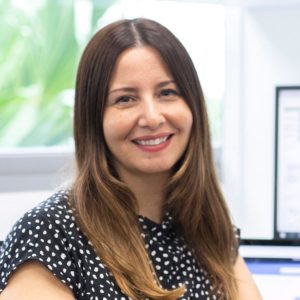SHINE’ing the Spotlight on… Mervat Quirke
 Driven to build connection and capability in the community, Mervat Quirke leads the partnership strategy at USC’s Thompson Institute, a world-class facility for mental health and neurological research.
Driven to build connection and capability in the community, Mervat Quirke leads the partnership strategy at USC’s Thompson Institute, a world-class facility for mental health and neurological research.
Mervat identifies, develops and maintains strategic partnerships with community, specialist and government groups locally, nationally and globally.
These partnerships support the success of a range of the Thompson Institute’s mental health research and community programs in areas including suicide prevention, youth mental health, ageing and dementia, and PTSD.
Her work also helps close the gap between research, industry and community –connecting more people with the benefits of mental health expertise, education and support.
Mervat has been a leader in the for-purpose charity sector for more than 20 years, and has led the transformation of charities, including Bloomhill Cancer Care where she served as CEO for seven years.
She holds an Executive Master of Business, which allows her to provide clearer insights into industry and community strategies.
Mervat sits on the Sunshine Coast Council Community Strategy leadership group as well as the Sunshine Coast Health Panel and her work has been recognised through local business awards.
Mervat, tell us about USC | The Thompson Institute, and the vision behind?
USC established the Thompson Institute in 2018 as a hub for world-class mental health research, teaching and clinical services. We have a unique, integrated model of care, which has put us at the forefront of research for some of regional Australia’s most pressing mental health issues including dementia, suicide prevention, post-traumatic stress disorder, and youth mental health. We are committed to finding cures and the best interventions for these conditions through onsite research and educating the next generation of mental health professionals and researchers. Our objectives are centred on a community engagement model that enables the rapid translation of research into practice.
What guided you towards working in the charity and now the mental health/general health and wellness space?
Unexpected adversities in my life led me to work in the for-purpose sector.
Having come from a war-torn country, my parents have always embedded in me the values of giving back and the responsibility of privilege.
After losing my husband to cancer in 2006, I decided to use my experience, time and energy to make a difference in the lives of others.
I knew early in my career that I was not motivated by delivering annual dividends to shareholders, so I wanted to give back through endeavours that matter and make a difference, in both a business and personal sense.
What traits and qualities do you admire in a leader?
Emotions are infectious, so having a leader that is positive, ethical, and forward-looking is so important. Good leaders have a stark authenticity about them. They value and champion individual differences in their people. They encourage growth, even when the growth won’t immediately improve their own business.
Good leaders can challenge a process while ensuring a diversity of voices, and that those voices are heard. A good leader can encourage the heart of their people and their community. We need visionaries who can inspire hope and a sense of purpose, while providing the pathway towards meaningful goals.
How has COVID-19 affected mental health in general and what sort of steps are you doing at The Thompson Institute introducing to try and help those in need?
Research has shown an increase in depression, anxiety, PTSD and stress in our community. Triggers for these conditions can include financial stress and job insecurity, housing affordability, as well as a feeling of a lack of control due to pandemic restrictions.
It is important to us at the Thompson Institute that we maintain our community-first focus, as we help meet the mental health needs of our people.
During the pandemic we developed our EMERALD program to specifically address the early onset of mental health conditions, and we provided access to our training through online programs. We are also proud representatives on health and community panels that support complex issues including, homelessness, suicide prevention, youth mental health.
How do you juggle being a busy career woman, a wife and a mum as you would have a very busy schedule?
The main challenge for me was overcoming the expectation that I had to be the best at everything, the best mother, leader, partner, and friend. It is unrealistic and it takes you away from looking after yourself.
Early on, I had to drop any notion of the work-life balance myth, because I had a full-time executive role and five children. For me to achieve enjoyment in my daily commitments, my career had co-exist with my personal life. Work-life integration allowed me to adjust my mindset to combine time for family while making a difference to others through my professional role.
And what’s next on the agenda for Mervat Quirke?
The danger of always planning the next big thing is that we can miss the chance to be present and grateful doing exactly what we are doing right now.
We don’t always have to be doing something bigger and better. There’s enormous satisfaction to be had in doing the same thing each day if we have a strong sense of purpose. So, I will keep doing what I’m doing. Building and strengthening the wonderful partnerships we have in our community and spending time with my grandkids.
Favourite movie and why?
Bad Mums. I was able to see this with two of my best friends and we laughed till we cried.
What’s one thing that you do for yourself every day?
I am very lucky. I have sisters and friends who enjoy a good laugh… so I will always make a daily call before work or after work
What mantra do you live by?
Stand beside or step aside. The work we do in mental health is too important to have anyone slow us down.
To find out more about Mervat Quirke head to:
Website
https://www.usc.edu.au/thompson-institute
Facebook
@USCThompsonInstitute

